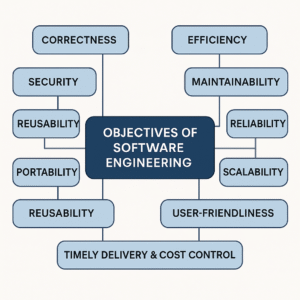Software Engineering – Definition, Objectives, Principles, and Needs.
Software Engineering is the disciplined application of engineering principles to the design, development, testing, and maintenance of software. It ensures that software is built syste
matically, works correctly, and meets user needs.
As technology becomes central to modern life, software engineering plays a crucial role in building safe, efficient, and high-quality digital systems.
Definition of Software Engineering
Software engineering is a structured approach to software development that applies engineering concepts to produce reliable and efficient software solutions. It includes a full life cycle: requirement gathering, design, coding, testing, deployment, and maintenance.
Key Objectives of Software Engineering
Correctness
The software must do what it is intended to do, without errors.
It should fulfill all the user’s functional and non-functional requirements.
Efficiency
Software should use system resources (memory, CPU) optimally.
It must be responsive and fast under normal conditions.
Maintainability
It should be easy to modify, fix bugs, or add new features.
Helps in long-term usability and cost control.
Reliability
The software should perform consistently without crashing or failing.
Especially important in critical systems like medical or financial software.
Scalability
Software should handle growth in user numbers, data, or operations smoothly.
Reusability
The goal is to write components (modules, functions) that can be reused in future projects.
Portability
The software should run across multiple platforms (Windows, Linux, mobile devices) with minimal change.
Security
Protecting the software from unauthorized access and attacks is crucial.
Security is built into design and not added later.
User-Friendliness
The software must be easy to use, even for non-technical users.
A good UI/UX boosts user satisfaction.
Timely Delivery & Cost Control
Deliver high-quality software on time and within budge
t using structured methods.
Principles of Software Engineering
The following principles guide software engineering practices:
Modularity: Break the software into smaller, manageable pieces (modules).
Abstraction: Hide complex logic; show only necessary information.
Reusability: Design parts of the software that can be reused in other projects.
Maintainability: Software should be easy to update and fix over time.
Scalability: Software should handle growing users or data without failing.
Security: Protect the software and user data from threats.
Testing and Verification: Always check if the software works as expected.
User-Centered Design: Focus on making the software useful and easy to use.
Documentation: Keep records of requirements, design, and changes for future reference.
Quality Assurance: Ensure every step delivers value and prevents bugs or failures.
Needs of Software Engineering
Here’s why software engineering is essential in today’s world:
Manage Complexity:
Modern software systems (e.g., banking, e-commerce, transport) are huge and complex. Engineering processes simplify them.Ensure Quality:
Engineering ensures that the software is functional, reliable, secure, and performs well.Reduce Cost & Time:
Planned development avoids mistakes, saving money and time.Maintenance:
Software must be easy to update and adapt to changing requirements.User Satisfaction:
Software must meet user expectations. Engineering involves gathering and verifying user needs.Team Coordination:
Engineering helps teams collaborate using shared models, designs, and methods.Handling Risk:
Software engineering identifies and manages risks early, especially in critical systems (e.g., healthcare, defense).Long-Term Planning:
Good software lasts years. Engineering ensures long-term success, not just short-term fixes.

Thank you for your sharing. I am worried that I lack creative ideas. It is your article that makes me full of hope. Thank you. But, I have a question, can you help me?